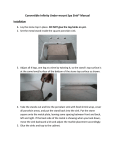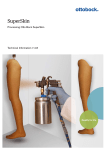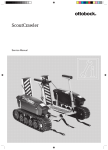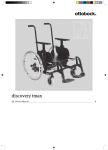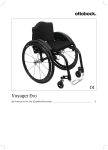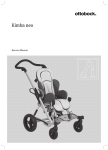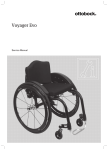Download Harmony® User's Guide
Transcript
Harmony® User’s Guide Welcome! Welcome to the Harmony® System! The Harmony System provides a superb connection to the prosthetic socket, maintains limb volume to limit pressure points on the limb, and offers you outstanding proprioception—or ‘feel’ for the prosthesis. To keep the Harmony System working as well as possible, it’s important that you take appropriate care of the Harmony System and also maintain limb and skin health. This User’s Guide will take you stepby-step through several aspects of Harmony System care, including putting the system on and taking the system off; caring for your skin, liner and sleeve; maintaining vacuum and fit; and troubleshooting any other issues that may arise. If you have any questions or concerns not addressed in this brochure, please contact your Prosthetist. Liner Protects your limb Sheath Makes it easy to slide into socket and creates an airspace for the vacuum Socket Your connection to the prosthesis Gaiter Protects the sleeve from the socket edges Sleeve Seals the vacuum air space Tubing Connects the pump to the socket’s air space Pump Creates an elevated vacuum in the socket so your limb stays connected Brochure This Harmony User’s Guide Fit Kit™ This kit helps you manage volume fluctuations in your residual limb Table of Contents Putting on Your System . . . . . . . . . . . . . . . . . . . . . . . . . . . . . . . . . . . . . . . . . . . . . . . . . 4 Taking off Your System . . . . . . . . . . . . . . . . . . . . . . . . . . . . . . . . . . . . . . . . . . . . . . . . . . 6 Maintaining Vacuum . . . . . . . . . . . . . . . . . . . . . . . . . . . . . . . . . . . . . . . . . . . . . . . . . . . 7 Maintaining Fit . . . . . . . . . . . . . . . . . . . . . . . . . . . . . . . . . . . . . . . . . . . . . . . . . . . . . . . . 8 Fit Kit Items . . . . . . . . . . . . . . . . . . . . . . . . . . . . . . . . . . . . . . . . . . . . . . . . . . . . . . . . . . . 9 Adding Spots and Socks . . . . . . . . . . . . . . . . . . . . . . . . . . . . . . . . . . . . . . . . . . . . . . . 10 A Note about Volume Loss . . . . . . . . . . . . . . . . . . . . . . . . . . . . . . . . . . . . . . . . . . . . . .11 Caring for the Harmony® System. . . . . . . . . . . . . . . . . . . . . . . . . . . . . . . . . . . . . . . . .12 Troubleshooting. . . . . . . . . . . . . . . . . . . . . . . . . . . . . . . . . . . . . . . . . . . . . . . . . . . . . . .14 2 3 Putting on Your System 1. First, turn the liner inside out (invert). Next, spray a small amount of water or skin-friendly lotion inside it and rub the inner walls together to spread it around. This lubrication will make it much easier to apply the liner. 5. Slide your limb into the socket, making sure you are stable, and stand up. 2. Line up the front of the liner with the front of the limb. Place the inverted liner snugly onto the end of the limb. Slightly bend your knee and gently roll the liner over your limb. 6. 5. 1. See the Adding Spots and Socks section of this brochure for directions on how to add the spot or half sock. Important: The liner, gaiter and sleeve must be rolled up, NOT pulled up. Place your open hands on opposing sides of the inverted liner, gaiter or sleeve. By lightly pressing your hands against the liner, gaiter or sleeve and sliding your hands up, the liner, gaiter or sleeve will unroll. Do not grab the top edge and pull. This will stretch, and potentially damage the liner, gaiter or sleeve. 7. Slightly bend your knee and roll up the gaiter over the edge of the socket to protect the sleeve from the socket edge. 7. 2. 8. Apply a small amount of hand lotion to the exposed 2˝ (5 cm) of the liner and thigh so they seal better with the sleeve. 3. To remove any trapped air bubbles, place your hands on the sides of the liner and lightly slide them from the bottom of the liner to the top a few times. 9. Roll sleeve over gaiter and liner and onto the thigh to complete the seal. 4. Roll the sheath over all but the top 2˝ (5 cm) of the liner. 2˝ (5 cm) of the liner must be left exposed (see arrow) so that it can seal with the sleeve, as shown. 3. 4. 4 6. Your Prosthetist will have placed marks on the sides of the liner to help you determine the correct fit. Make sure these marks are visible. If the mark on the liner is below the top of the socket, add a spot or half sock to raise the mark above the socket edge. 8. After about 20 steps you should begin to see and feel the system functioning, although it may take up to 40 steps to attain full linkage. 9. 5 Taking off Your System 1. After a short period of use, the gaiter will normally adhere to the sleeve. They can be pulled down together to make it easier to put on later, or pulled down separately. 2. Remove your limb from the system. Place the Harmony® System where it can not be easily knocked down or tripped over. Maintaining Vacuum Vacuum check Avoiding leaks Make sure you have vacuum every time you put on your system. The most important thing you can do to avoid leaks is to protect your sleeve. If you bump your sleeve against a hard object such as a chair or table leg, it can create a hole in the sleeve and the system will leak. Avoid kneeling on hard surfaces and bumping against hard objects. If this is difficult to do, for example, if you have a job that requires kneeling, contact your Prosthetist for advice on how to protect the sleeve, such as having a protective slip cover made. Take 20-40 steps to create vacuum in your system. After about 10 minutes, check the following issues: 1. Is the sleeve pulled in sharply at the socket edge? 2. Do you feel well connected to the socket? 3. Does your leg feel relatively light in weight? If you answer ‘Yes’ to all three questions, and a snug, comfortable fit is maintained all day, you probably have good vacuum. If you lose the snug, comfortable fit within the first hour, you probably have lost vacuum. If you think you may have lost vacuum, look through the Troubleshooting section of this pamphlet, or contact your Prosthetist. 6 7 Maintaining Fit Fit Kit Items If you notice any changes in the fit of your Harmony® System—that your leg feels heavy, that the liner marks are not visible, or that you have unusual pressure on your residual limb—you may have lost vacuum in the system or had volume changes in your residual limb. To improve fit 1. First make sure you have vacuum and restore it if needed. To determine whether you have vacuum, see the previous Vacuum Check section. If you don’t have vacuum, use the Troubleshooting table or contact your Prosthetist to restore it. 2. If you’re sure you have vacuum, but still don’t have proper fit, you may have lost volume in your residual limb. When your residual limb loses volume it creates a void between the limb and socket, which can create a sensation of pressure. To resolve this issue you may have to fill the void with socks or polyurethane spots. 8 9 Adding Spots and Socks To compensate for limb volume loss: visible and your limb feels snug and comfortable. t Begin by adding just an Ottobock Spot to the end of your liner. If this improves the fit but not completely, remove the spot and try a half sock. You may try other combinations of spots and half socks. Contact your Prosthetist if you have to use more than 3 fillers (sheaths, spots and/or socks). t If adding the spots and half socks made the pressure or discomfort worse, try using a full sock instead. If this improves the fit but not completely, try a combination of 1 spot and 1 full sock, or 1 half sock and 1 full sock. Feel free to experiment using other combinations of spots and socks until the marks on your liner are 10 How to Add a Spot or Sock Place all spots, half socks and full socks between the liner and the sheath. The sheath prevents the spot from blocking the hole in the bottom of the socket and prevents lint from the socks from clogging the filter located in the hole. Steps 1. Remove the sheath 2. Place the spots/socks over the end of the liner. 3. Roll the sheath over the spots/socks, and liner. A Note about Volume Loss It is perfectly normal for your limb to lose volume when you first begin using the Harmony® System. Expect it to take 2-6 weeks for your residual limb to stabilize and lose excess fluids. As volume is lost, you may need to add spots and socks to keep the two marks on the liner visible at the edge of the socket and to restore the snug, comfortable fit. At the end of this 2-6 week volume stabilization period, your Prosthetist will switch you to a permanent socket. With a stable limb volume, you will discover that the Harmony System will minimize daily volume loss. This means that the two marks on the liner will stay even with the edge of the socket and the snug, comfortable fit will last all day. If the limb noticeably loses volume during the day, your system probably has a vacuum leak. Use the Troubleshooting table in this brochure to eliminate the leak. This is usually just a matter of replacing the sleeve. Another change you may occasionally see is weekly/ seasonal fluctuations due to such things as alterations in your diet or the weather. The Fit Kit™ will help you to adjust for these fluctuations. Finally, most people observe a slow volume loss over several months or years as the tissues gradually shrink. So, after a number of months or years you may find you need to use an extra spot, sheath, and/or sock on a permanent basis. Contact your Prosthetist to discuss getting a new socket when you have to routinely wear more than three of these fillers (sheaths, spots or socks) to keep the liner marks visible and maintain a snug, comfortable fit. 11 Caring for the Harmony® System Caring for your skin Your skin is the most important element in the Harmony System. To keep it healthy, check your limb every time you use and remove the system. Talk to your Prosthetist if you see any signs that the skin is irritated, such as red marks. To maintain skin health, we recommend applying a small amount of lubricant such as “Derma Prevent” (453H12) each day before putting on your system. Use a dollop about the size of a nickel. Caring for your liner Create a routine by picking a time of day (such as right before you go to bed) to thoroughly examine and wash your liner. Carefully inspect your liner for tears or abrasions that may allow air to escape. If you see such problems you may be losing vacuum. Use a replacement liner and contact your Prosthetist. See the Maintaining Vacuum and Fit sections of this brochure or contact your Prosthetist. Caring for your sleeve and gaiter 1. Check the smooth side of your sleeve every day for tears or holes. Stretch the sleeve to make holes more visible. If you see a hole, contact your Prosthetist to obtain a replacement sleeve. 2. Hand or machine wash the inside and outside of your sleeve as well as your liner on a weekly basis. Use water and a non-allergenic soap such as Ottobock “Derma Clean” (453H10) if washing by hand, or normal laundry soap if washing by machine. The sleeve can be dried in a clothes dryer or left to air-dry. 3. If the inside of the sleeve feels tacky, you may dust it lightly with baby powder. 4. You should have at least 2 good sleeves on hand since sleeves need to be washed and dried weekly and replaced when damaged. Also keep a replacement gaiter. Contact your Prosthetist to order sleeves or gaiters. Installing a new gaiter 1. Remove old gaiter and tape. 2. Pull the narrow end of the tapered gaiter over the top of the socket. 3. Confirm that the gaiter is approximately 1˝ (2.5 cm) below the two dips on the back of the socket. 4. Affix the gaiter to the socket by using vinyl or electrical tape. Tape circumferentially around the entire socket. Installing a new sleeve 1. Pull the narrow end of the tapered sleeve over the gaiter and socket. It should extend at least 2˝ (5 cm) below the bottom of the gaiter. 2. Attach sleeve to socket with a Velcro® band (or with vinyl or electrical tape), making sure the connection is tight to attain a good seal. Clean the liner inside and out with a non-allergenic, skin-friendly soap such as Ottobock “Derma Clean” (453H10) and a clean cloth. Do not use alcohol or bleach and avoid scented soaps. You can clean the liner in the shower with your normal soap if it is non-allergenic and unscented. Dry your liner with a towel. When ordering a new liner, it’s a good idea to keep your old liner as a back up. 12 13 Troubleshooting Problem Lost vacuum Reason Solution Hole in sleeve Replace sleeve or repair with sealant. You are using a cloth covered liner Wear an uncovered liner only. Cloth sheath is covering the entire liner Leave the top 2˝ (5 cm) of the liner uncovered by the sheath. You didn’t lubricate the top of the liner Apply a thin layer of lubricant to the top 2˝ (5 cm) of the liner. You didn’t use Velcro® strap or tape around bottom of sleeve Apply Velcro® strap or tape around the bottom of the sleeve. Make sure you have vacuum before taking the following steps: Limb pressure or discomfort, and/or The limb has lost volume Liner marks are below top of socket Add a spot. If it helps, but doesn’t resolve the issue, try two spots or a combination of spots and half socks. If the spots/half socks made the problem worse, try a full sock with a spot or half sock. If the problem isn’t resolved, contact your Prosthetist for assistance. Lost vacuum See the Lost vacuum section in this table. The limb has lost volume See Limb pressure or discomfort section in this table. Vacuum extended to thigh Leave the top 2˝ (5 cm) of the liner uncovered by the sheath. Do not use a cloth-covered liner. Lost vacuum See the Lost vacuum section in this table. Limb has lost volume See the Adding Spots and Socks section of this brochure. Bunching behind my knee Liner and sleeve have slid down the thigh Roll down the sleeve. Bend your knee slightly. Lightly pull the liner up the thigh to remove any pucker behind the knee. With the knee still slightly bent, roll the sleeve up the thigh. Limb slides in liner Excessive sweat or lubricant in the liner Take off your Harmony® System. Use a towel and dry the inside of the liner. Put your Harmony system back on. Strong odor Liner is dirty Wash the liner daily described in this brochure. Clean with hydrogen peroxide if the odor persists. Wash and rinse thoroughly. Red marks on stump Red marks around thigh Torn or abraded liner 14 15 © 2012 Otto Bock HealthCare LP · 12072403.1 · 8/12 Ottobock P 800 328 4058 · F 800 962 2549 www.ottobockus.com









